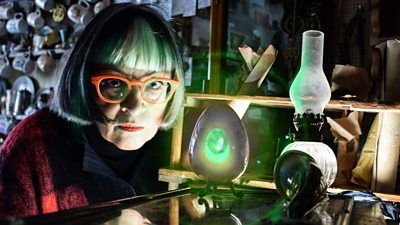Victorian Sensations
Seeing and Believing (1x3)
:
In the final episode of this series, psychotherapist Philippa Perry time-travels back to the 1890s to explore how the late Victorian passion for science co-exists with a deeply held belief in the paranormal. Using a collection of rare and restored Victorian films from the BFI National Archive, she shows how the latest media innovations made use of contemporary ideas of ghosts and the afterlife – and how this ‘new media’ anticipated today’s networked world.
The final years of Queen Victoria’s reign are a moment when the old Victorian order rubs shoulders with the beginnings of our modern world. This is a chaotic, febrile time of discovery and innovation in science and technology, entertainment and art, and the Victorians have to make sense of it all.
Philippa finds out how Marconi’s early experiments with wireless telegraphy encouraged speculation amongst the public and scientists that telepathy – communication between minds – would be the next scientific breakthrough. She also replicates eminent physicist Oliver Lodge’s pioneering experiment with radio waves and discovers his fascination for exploring the paranormal with the Society for Psychical Research (SPR). This Victorian group of ghost hunters includes William James, a pioneer of psychology, biologist Alfred Russel Wallace and even Prime Minister William Gladstone. Buried in the archives of the SPR in Cambridge University Library, Philippa finds an incredible Census of Hallucinations that contains 17,000 ghostly encounters sourced from the Victorian public.
Maybe it’s not surprising that people of the age saw so many ghosts because, in a sense, spirits do haunt the Victorian home. Every Victorian innovation - from photography to motion pictures, phonographs to fantasy books – had its own supernatural genre. Arthur Conan Doyle, creator of the hyper-rational Sherlock Holmes, drew on his real-life experience as a ghostbuster to write his ghostly fiction. Philippa learns the art of s
